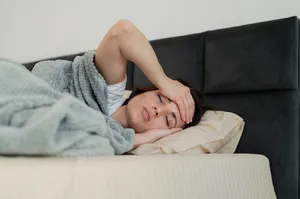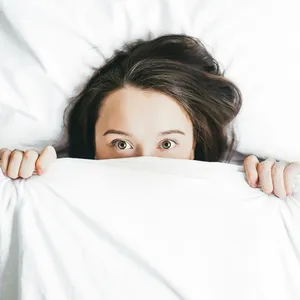Sleep Quality Instead of Quantity: Why You Are Tired Despite 7 Hours of Sleep
Theresa Hauser, MSc. | 06.11.2025

Many people sleep long enough – and are still exhausted in the morning. They look at the clock, count their seven or eight hours of sleep, and wonder: Why am I still tired?
The answer often lies less in the duration of sleep than in the quality of sleep. In this article, we show what “sleep quality” means from a scientific perspective, which biological processes play a role – and how you can specifically improve them.
What does sleep quality actually mean?
Sleep quality describes how restful sleep is – not how long it lasts. The key factor is the structure of the sleep stages, which includes the transition between stages:
- Light sleep (N1, N2) – transition into sleep, but also the primary sleep that each of us has 50-60% of the night, recovery and memory functions
- Deep sleep (N3) – physical regeneration, special hormone productions, immune system strengthening, strengthening of (declarative) factual knowledge
- REM sleep – emotional processing, procedural learning processes (like simulating a sports movement or musical instrument use), emotional dreaming experience
Only when these phases occur in sufficient duration and sequence does one feel rested. Missing deep sleep or REM parts lead to fatigue – even with nominally “sufficient” hours.
Why you are tired despite enough sleep
- Fragmented sleep
Short awakening phases at night – often unnoticed – interrupt the sleep cycle. Reasons can include stress, alcohol, noise, light, or temperature fluctuations. With sleep² you can see this in your hypnogram in detail at the small red lines during the night.
- Disturbed sleep architecture
Sleep apnea, restless legs syndrome, medications, but also psychoactive substances like alcohol alter the composition of sleep phases. The EEG image then often shows less deep and REM sleep.
- Irregular rhythm
Constantly shifting sleep times (e.g., on weekends) throws the internal clock out of sync. The body cannot optimally build sleep phases.
- Psychological factors
Brooding, worries, or tension activate the stress system (cortisol, sympathetic nervous system). This blocks natural sleep depth – one sleeps “superficially.”
Unfavorable habits
Caffeine in the late afternoon, screen light in the evening, heavy meals, or alcohol significantly reduce the REM and/or deep sleep portion and lead to more frequent wake reactions at night.
Test sleep² now and learn to sleep better!
To the sleep² appMeasuring and Understanding Sleep Quality
Many modern sleep trackers – including sleep² – capture indicators such as:
- Sleep stages
- Heart rate & heart rate variability (HRV)
- Sleep interruptions
- Time to fall asleep and wake-up time
It is important to interpret the data correctly: A "quiet night" on the watch does not automatically mean restorative sleep. You also need to be cautious with short wake phases, which many sleep trackers unfortunately still capture insufficiently accurately and significantly determine how you feel the next morning.
The combination of subjective perception (How fit do you feel?) and objective measurements provides the most reliable insights overall.
How You Can Improve Sleep Quality
Scientifically proven measures often have a stronger effect than pills or other remedies:
- Consistent rhythm
Go to bed and wake up at the same time every day – even on weekends. This stabilizes the circadian clock.
- Light management
Bright daylight in the morning, dimmed light in the evening. Blue light filters and dark bedrooms promote melatonin production.
- Optimize room climate
18–20 °C, fresh air, no loud devices. Even pets or smartphones on the bedside table can unconsciously disturb.
- Mindfulness & relaxation
Breathing exercises, progressive muscle relaxation, or short meditation lower pulse and cortisol.
- Behavioral therapy for sleep disorders (CBT-I)
Cognitive-behavioral sleep therapy is considered the gold standard for chronic insomnia – and more sustainable than medication.
- Track & adjust
Those who measure regularly recognize patterns: e.g., alcohol → more wake phases; exercise → better deep sleep. This is where sleep² steps in with personalized analysis.
Sleep Quality vs. Sleep Duration: The Misunderstanding
A common misconception is: "I need eight hours, otherwise I'm not fit."
In reality, someone with 6.5 hours of high-quality sleep can be more rested than someone with 8.5 hours of fragmented sleep.
What matters is not the number on the clock, but the feeling in the morning and the biological recovery effect behind it.
When You Should Seek Medical Help
Persistent daytime fatigue, concentration problems, or frequent awakenings can indicate a sleep disorder.
Professional diagnostics (e.g., polysomnography in a sleep lab) can clarify whether there are breathing disorders, movement disorders, or psychological stress. Early clarification prevents long-term consequences such as high blood pressure, metabolic problems, or burnout.
Conclusion
It's not the duration of sleep that determines recovery, but what happens in the brain during that time.
Those who are constantly tired should focus less on pure sleep duration or their "Sleep Score" and more on the quality of the night. A regular rhythm, a pleasant sleep environment, and conscious management of stress are the most effective levers for genuine, restorative sleep.





